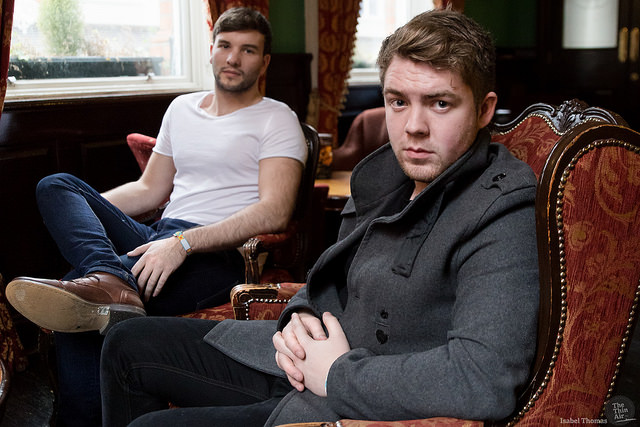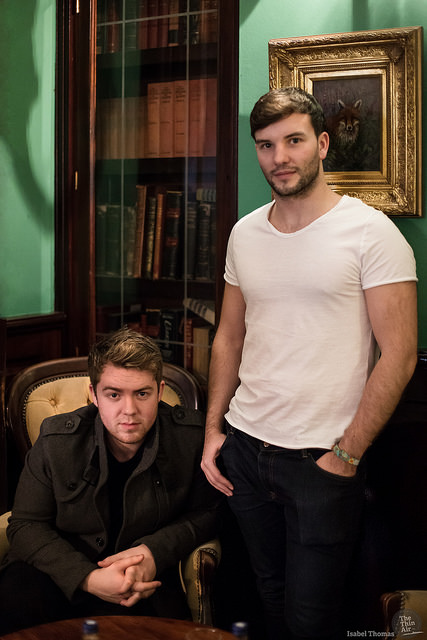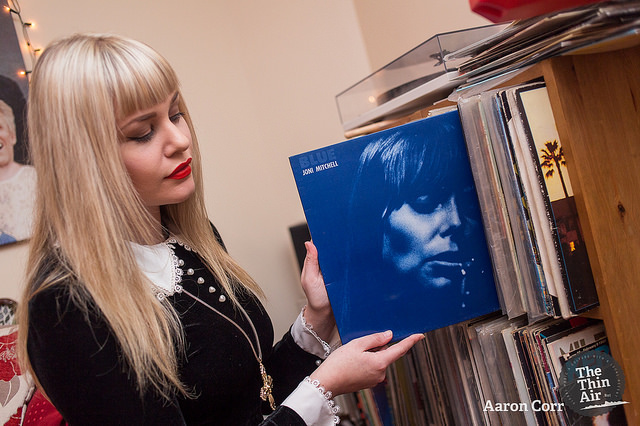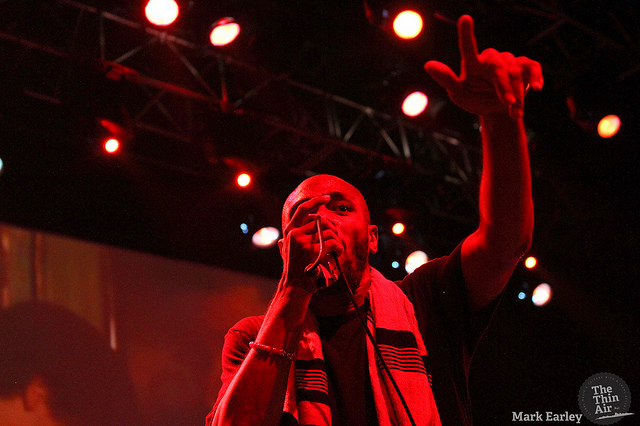With their first headlining gig and EP launch to take place this Thursday (November 27) at Dublin’s Sugar Club, Joe Madsen chats with folk duo Ryan McCloskey and John Doherty AKA Little Hours about the rollercoaster ride of a year they’ve been having since their formation back in February. Photos by Isabel Thomas.
How long have you guys known each other and how long have you been playing together?
Ryan: “For about five or six years. We’ve played with a lot of different cover bands over the past few years, but the original thing came into formation at the start of this year.”
John: “We actually went into studio about a month after we got together writing because I already had two songs (‘It’s Still Love’ and ‘Tired’), took them to Ryan and said, “Do you like these?” And he said, “Yeah, let’s go record them.”
When you were playing with cover bands and recording in the studio, what were you guys doing in the meantime to support yourselves?
John: “Well, I’m in college for songwriting, so that’s what I do during the day. I’ve got it pretty easy.”
Ryan: “And I’m a software engineer here in Dublin, so I’m on the other end of the spectrum working full time. When you come back after work, it’s difficult because you have to keep going once you get home to do what you want. It’s nice having the security of the job, but it can be tough doing both.”
You released the single [‘It’s Still Love’] in June after starting together in February. How was that going into studio, without even having started gigging together yet?
Ryan: “Yeah, we weren’t gigging as Little Hours – we didn’t even have the name Little Hours so we were just in the studio recording for a nameless band at the time. It was always something we knew we were gonna end up doing. John had written all of the first two tracks, so we took them to the studio and said, “Let’s just do this.””
How does your relationship as friends inform your relationship as collaborators and artists?
John: “Well, we hate each other. (They both laugh) We don’t mind hurting each other’s feelings.”
Ryan: “At the start, there wasn’t any co-writing, really. It’s funny how it worked out. The first two tracks are basically John’s, and he came to me with them. The last two tracks [‘Ember’ and ‘Crossfire’] are basically me, and I came to John with them.”
So what’s the songwriting process like?
Ryan: “Some songs come with the lyrics first, some come with a melody or a riff. But we’re starting to structure the process in our own little way… we’ve both kind of agreed that it’s better to write the lyrics first and then get a melody or something like that, but that’s not always the way that it happens. We never really find music hard. Lyrics are harder.”
Who takes the lead in songwriting?
Ryan: “There’s a nice balance. I mean, I’m the older one (24), so sometimes a come to John (20) with stuff that might get a bit darker or deeper, and he’ll say, “Alright, let’s tone it back!” and it’s nice having someone who can do that for you.”
John: “And then sometimes I come up with stuff and he says, “…it’s a bit cheesy.””
So when you’re writing the lyrics for those numbers, do you draw on your own personal experiences for material?
John: “Sometimes you’ll get them from yourself, but sometimes you put yourself in someone else’s position and write from their point of view. You’re not as protective of what they’re going through.”
Ryan: “It’s easy to pick at other people’s problems!”
Who do you feel are your strongest musical influences?
Ryan: “Biggest mutual influence would probably be Bon Iver. Anything to do with Justin Vernon is our kind of thing. Let’s see, Van Morrison…”
John: “Chris Martin. A fun part about having played so many covers is that you learn how songs are put together. You learn people’s tricks and you see how very similar so many songs are.”
The tracks ‘It’s Still Love’ and ‘Tired’ have a full band recording. When you’re in studio, how does it feel having other hands on your work in having a full band behind you?
John: “Well, those are guys we’d been playing with for years, so we’re very used to them.”
Ryan: “The main reason we stripped it back for the next two tracks was because when drums were introduced, we felt the genre was moving away from where we wanted it to be.”
You started playing in February, you released a single in June after going into studio, and by August, you were playing Electric Picnic. Has this year felt like a quick turnaround or overwhelming at all?
Ryan: “It’s strange. We just went to studio, said to ourselves, “This is what we want to do,” recorded the songs, and put them out there, but you need to pick up management and PR to express yourself in a national context. We got Electric Picnic through a competition, and that was fantastic.”
What you were doing in Killybeg to get the kind of attention and recognition you needed?
Ryan: “The manager thing sort of happened by luck. He (Bryan Bradley) stumbled upon us on YouTube. Then Picnic happened, and it took off from there. If Picnic hadn’t happened, it would’ve been hard for him to see where things were going, but when you say you’re playing Picnic, people start to talk.”
John: “I was just happy we were getting free tickets to the show!”
So just to clarify, was Picnic the first live performance you guys had done as Little Hours?
Ryan: “That’s a good question… it probably was.”
John: “We’ve played something like 200 gigs together before with the cover bands, so it’s weird thinking that that was our first Little Hours gig. It’s funny how that happened… I don’t think we’ve ever thought about that until right now.”
Ryan: “I had this picture in my head that the live scene was just gone and that the thing to do was just write a really good song and push it to people. But then I realized that the live thing is paramount, really, it’s the most important thing. Picnic came along and we realized we needed to be playing a lot… so yeah, that was our first gig.”
Have played with artists like Tom Baxter and James Bay, what have you taken from those first experiences? How has it impacted how you’re going forward as live performers?
John: The best thing after playing a show with someone is thinking, “Right. I want to do that, I want to try that.” You’re always getting inspiration afterward to keep writing.
Ryan: We talked to Tom a lot – really, really nice guy – and he told us the ups and downs of everything. It’s great to talk to someone else who’s already done it.
How are you getting ready for you’re debut headlining performance at Sugar Club?
John: “Loads of water.”
Ryan: “We’re practicing every chance we can get. We go to Donegal most weekends because we’ve been playing these past few weeks with different artists, but we want to put on something really special for the Sugar Club performance. You have to give back to the people who have bought the EP and been supporting us the whole way.”
What’s the plan moving forward?
John: “Get back into the studio and start recording some new stuff.”
So while you’re laying down new stuff in studio, do you think you’ll want to get on more supporting acts like you’ve been doing?
Ryan: “Building a profile is so important, and support acts is the best way to do it. You go there, people buy your CD after seeing you for the first time, it’s amazing.”
John: “You get to go out to a new audience who have no idea who you are. Every night you’re getting a whole new bunch of fans.”
One last question: the band name?
Ryan: “I’ve been in college the past four years and just started a job this year, so time has been really restricted. The only times we’d both be kind of free would be 2 or 3 in the morning, so we’d both be sitting with pens and papers, a couple of drinks…”
John: “… cranberry juice…”
Ryan: “… and maybe just an acoustic and piano, and we’d be falling asleep over our instruments. It did take us a while to come up with the name, but once we did, it just made sense to us.”
Buy tickets to Little Hours’ Sugar Club show here.







